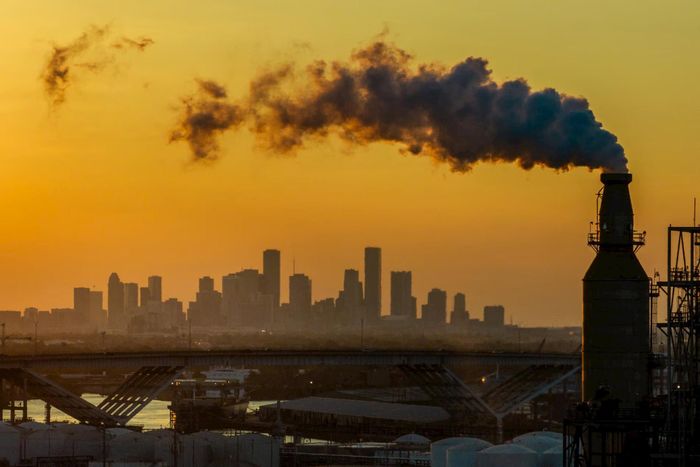Oil and gas activity increases impact on climate goals

According to a report from Global Energy Monitor - a non-governmental organization headquartered in San Francisco (USA), fossil fuel producers around the world are on track to nearly quadruple the amount of oil and gas extracted. from new projects approved at the end of the decade, with the United States leading a series of activities that threaten to disrupt agreed climate goals.
Previously, in 2021, the International Energy Agency (IEA) announced that there will be no new oil and gas infrastructure if the planet wants to avoid increasing global temperatures by up to 1.5 degrees Celsius, high than pre-industrial times. Breaching this warming threshold, agreed by governments in the Paris climate agreement, will see increasingly worse impacts such as heatwaves, floods, droughts and melting glaciers, scientists warn. …
But despite the IEA's announcement, countries and major fossil fuel companies forged ahead with a flood of new oil and gas activities. According to a report by Global Energy Monitor, the equivalent of at least 20 billion barrels of new oil and gas has been discovered for future drilling since this time.
Last year, at least 20 oil and gas fields were ready and approved for exploitation after being discovered and processed to remove 8 billion barrels of oil equivalent. The report also shows that, by the end of the decade, the fossil fuel industry aims to process nearly four times this amount, equivalent to 31 billion barrels of oil, across 64 new oil and gas fields.
According to this report, the United States - the country that has produced more crude oil than any other country has produced for the past six consecutive years - leads in new oil and gas projects in 2022 and 2023. Guyana ranks second, with countries in the Americas accounting for 40% of all new oil sanctions in the past two years.
The failure to slow down even slightly the hunt for new oil and gas risks dealing a fatal blow to already fragile hopes of keeping the world's temperature below 1.5 degrees Celsius. a limit that scientists predict will be surpassed within a decade.
It happens when major oil companies miss or lower their own targets to cut planet-warming emissions. At a recent industry conference in Texas (USA), the boss of Saudi Aramco - the world's largest oil company said we should 'give up the illusion' about phasing out oil and gas.
Mr. Scott Zimmerman - Project Director of global oil and gas production tracking company Global Energy Monitor said: 'Despite repeated and clear warnings that no new oil and gas fields will help meet the target. The temperature target is 1.5 degrees Celsius, the oil and gas industry continues to explore and approve new projects. It shows a lack of supply-side commitment to climate goals.'
Operating oil and gas infrastructure would be enough to push world temperatures above the 1.5 degrees Celsius threshold, and additional planned operations would only increase global temperatures further. According to Global Energy Monitor, as of the 2021 IEA report, a total of 45 projects have been completely phased out, with 16 billion barrels of oil equivalent, almost certainly an understated emissions number because it does not include includes unconventional mining activities, such as fracking (hydraulic fracturing, a mining technique that uses fluid pressure to crack underground rock strata).
While the United States maintains its leadership position in oil and gas with many newly discovered fields, new areas of the world are now being focused on production by fossil fuel producers, among them, South America and Africa becomes a hot spot for future projects.
Of the 22 countries with significant oil and gas discoveries in the past two years, four countries: Cyprus, Guyana, Namibia and Zimbabwe accounted for more than a third of the discoveries, although until recently they were only able to exploit them. Very little or no oil and gas can be exploited. The Shahini gas field in Iran is believed to contain 623 billion cubic meters of gas, the largest discovery in the past two years, followed by TotalEnergies' Venus project in Namibia. The Kodiak project in Alaska, overseen by Pantheon Resources, is the third largest potential new oil and gas field.
Mr. Zimmerman said: 'Oil and gas producers have come up with all kinds of reasons to continue to explore and develop new fields, but none of these reasons stand up. Meanwhile, science has clearly shown that, unless new oil and gas deposits continue to be exploited, the planet will exceed its carrying capacity.
Westwood Energy - an energy market research and consulting company headquartered in London (UK) predicts that less oil and gas exploration drilling activities will take place, smaller reserves will be discovered, and the rate of oil exploration will decrease. The success rate is lower than in 2023, but exploration demand remains unchanged in 2024. The link between oil prices and oil and gas drilling that has existed for many years may finally be broken. disruption as oil and gas companies balance their exploration ambitions with the pace of the energy transition.
You should read it
- ★ The surprising relationship between climate change - birth rate and consequences
- ★ Global warming is killing intestinal bacteria in lizards
- ★ Climate change is causing the sea to flow faster, scientists are still confused about what the harm will be
- ★ Climate change puts bees at risk of extinction, but it's not too late for humanity to save them and save themselves
- ★ Look for evidence of climate change in Antarctica with an iPhone